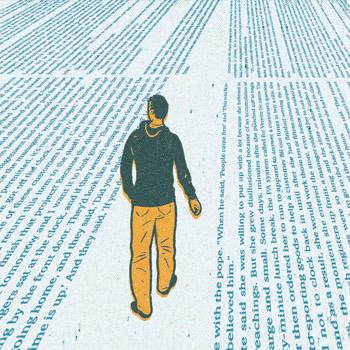Dickinson College
Babbling Books
by Christopher Maier '99

In the 13 years since graduating from Dickinson, I’ve moved 12 times. When it’s time to pack up and go, I summon friends and family to help with the schlepping and stacking. Everything moves along smoothly until we come to whatever room I’ve designated “the office”—that’s where we find the wall of boxes labeled “BOOKS.” A few people glance at their watches and excuse themselves. The others start asking questions like, “Did you really read all of these?” and “You know you can get this stuff on the Kindle, right?” and “Why didn’t you just hire a professional mover like any other adult would do?”
Wrapped up in there is a valid question: Why do some of us—many of us, I’m sure—elect to lug around ever-growing repositories of the written word that can be measured by the ton, the bulk of which we’ve already devoured and aren’t likely to re-read in full (or in even tiny part) anytime soon? Is it to make sure everyone who visits the house can see the notches on our well-cultured belts? Is it a shameful act of hoarding? Is it just because we like to torture our friends on moving day?
In my case, it’s because books—in their old-school, ink-and-paper form—offer something that I’d rather not part with. Even as digitized literature dishes up new and convenient ways to interact with the written word, there are three things that will keep my library of printed books growing.
Books are bookmarks. Life bookmarks, that is. I’ll often walk into my office and end up scanning spines of books that are rich with memories. They recall not just the narratives on their pages but also who I was when I read the book and where I was in life. I can remember the first time I read George Orwell’s 1984—junior high, summertime, windows open, staying up all night. I think that was the summer I fell in love with writing. I can remember sitting in a hot attic room in London reading Graham Swift’s Waterland, a novel set in England’s East Anglia, where I’d begin a transformative academic year abroad just a few weeks later. Every time I spot the thick, black spine of Doris Kearns Goodwin’s Team of Rivals, I remember giving that exact volume to my grandmother as a Christmas gift; when she died two months later, the book made its way back to me, her cardboard bookmark forever pressed between pages 26 and 27.
Books are intimate. I take notes in books. I scrawl in the margins and highlight sentences and make dots in the corners of pages with particularly inspirational passages. I’ve tried to approximate these tactile experiences on my Nook, but I end up lost in two-dimensional space, feeling like I’m doctoring up a business report in Microsoft Word—and knowing that two months later I’ll never have the tenacity to track down that note again. Yet I can close my eyes and see that Mark Antony begins to address the grieving Romans on the top half of a right-hand page about three-fifths of the way through my printed copy of Julius Caesar.
Books are beautiful. A lofty claim, perhaps, but we most often encounter something we call “beauty” when our senses are overwhelmed to the point that we might as well just start babbling. And reading a book in hard form is a rich, multisensory experience—one that doesn’t translate well to the digital world. Paper has texture. Ink smells. Colors bleed. Pages make a soft rubbing sound as they pass through our fingers. You could blindfold me and stick the 1993 Routledge reprint of William Morris’ News from Nowhere in my hands, and after giving it a few flips and a good sniffing, I could probably tell you what I was holding. Books have the power to engage our senses in ways that we often don’t even recognize, and because of this they provide us an experience of depth and immersion that you might call beauty.
Look at me: I’m babbling.
Christopher Maier ’99 is a fiction writer and creative director at 50,000feet, heading up the agency’s Washington, D.C., office. At Dickinson, he majored in English and studied abroad in the college’s program at the University of East Anglia.
Published October 1, 2012